Getting back on the wagon here after missing a week. Several good things to read here, bookended by some new music.
You can get all of the articles from this week as a Readlist here.
Song: “Don’t Stop” by Joey Purp
Lately, Chicago rap has become associated— at least in the mainstream media— with Drill and Chief Keef. If nothing else, that demonstrates yet again the tendency to present rap within a narrative of either material excess or violence (or both). I won’t get into that any more right now, except to say that, unsurprisingly, there is more going on than that. I honestly hadn’t heard of Joey Purp until I found this song posted on Potholes in My Blog a few days ago, nor had I heard of the SAVEMONEY crew, of which he is a member (though I had heard Chance the Rapper, who is also doing some good stuff). But it’s always nice to hear someone who cares about rapping, rather than just being a rapper— especially coming out of Chicago these days. I’m not saying that this will change your life or anything, but there is skill here, and craft, and attention to the way words fit together— which is a large part of what makes good rap good.
Article: “Meet Harry Beck, the Genius Behind London’s Iconic Subway Map” by Amar Toor
I knew a bit about this story already— I bought a book about the Underground map while I was in London— but if you don’t know the story this is a nice, brief introduction. Transmit maps are something most of us probably rarely think about, even if we use them all the time, and the design that Harry Beck developed for the London Underground map now seems obvious and unremarkable because pretty much all transit maps the world over use something very similar. But the thing is it wasn’t obvious at all, at the time; Beck’s main insight was that when people rode the tube, they didn’t need to know distances or even, exactly, where a particular stop was in the city (except for where they were getting on and off); they needed to know which line a particular stop was on, and where they could switch from one line to another. In other words, once you’re in the system, you care more about the system, internally, than about how it relates to the world above ground. So, Beck created a map that neatly and clearly gave you that information, and nothing else. That, to me, is the goal of information design in general.
Article: “The Microhistorian” by Francesca Mari
This is a review of the two (!) collections of essays that Jill Lepore published last year (and she has another new book coming out pretty soon, in case you need help feeling inadequate), but it’s also a kind of mini-profile of Lepore as a writer and historian. Lepore identifies with the school of historical writing called “microhistory,” which tries to use the small details of the lives of ordinary people (relatively ordinary; often the only reason we know anything about them is because they weren’t quite ordinary) to explain or gain insight into big historical events and changes. This usually makes for a more readable kind of historical writing, and Lepore certainly has a populist tendency— by which I mean only that she thinks everybody should be reading about history, and that it is part of the responsibility of (at least some) historians to make it so they want to do that. I am a Lepore fan, and this review does a good job of describing what’s appealing without her writing without being fawning or uncritical.
Article: “Come and Get It: How Sperm Became One of America’s Hottest Exports” by Brooke Jarvis
Apparently, the United States is a source of donated sperm for much of the rest of the world. This is mostly because we have— by chance rather than design— a unique combination of very strict laws in terms of screening for diseases and certain genetic conditions (which make donations from America relatively safe) and permissive ones in terms of anonymity and payment (both of which encourage donation, meaning we have a larger pool of donors and more supply than many other places— for instance, the U.K, where anonymous donations were made illegal a few years ago).
Also, you have to give them credit for the title.
Article: “The Retro Wife” by Lisa Miller
This article is a couple of weeks old now, but I missed it somehow at the time. I am recommending it because I think it is worth paying attention to, not because I like it; it is frequently infuriating, primarily because of the ways in which is mischaracterizes feminism while ignoring the ways that its achievements are indispensable to the situation it describes. (I like to call this the Ann Coulter Problem— she hates and rejects feminism, but would never have the position she has without it). The basic observation that Miller is making here is that a surprising number of women (the implication is that it’s a surprising number; she doesn’t actually give us any numbers) are choosing to assume the “traditional” role of wife and mother and letting their husbands be the breadwinners. Fine— that’s an empirical claim, and while Miller doesn’t do a lot to back it up, it’s not implausible. And the general reasons that she gives for why this is happening make sense; couples are realizing that a situation in which both partners are trying to work and manage life at home, including children, is stressful, and that a division of labor makes sense for them. Also fine. The question then, would be why its the women who stay home more often. There are a couple of possible explanations for that that wouldn’t bother me, or at least wouldn’t surprise me: gender stereotypes are still prevalent, and people feel uncomfortable going outside them; or, it makes economic sense for the woman to quite, since the odds are good that her husband make more money than she does. Miller’s preferred explanation, though, seems to be a biological one. She writes:
Feminism has fizzled, its promise only half-fulfilled [sic]. This is the revelation of the moment, hashed and rehashed on blogs and talk shows, a cause of grief for some, fury for others. American women are better educated than they’ve ever been, better educated now than men, but they get distracted during their prime earning years by the urge to procreate. (emphasis added)
She repeats the point toward the end of the piece, saying that “Feminism has never fully relieved women from feeling that the domestic domain is theirs to manage, no matter what else their juggling.” As with so many things in this article, that can be explained by the imposition of gender roles as easily as by resorting to women’s “nature,” but my main complaint is that Miller contradicts herself. Toward the middle of the piece, she suggests that
If feminism is not only about creating an equitable society but also a means to fulfillment for individual women, and if the rewards of working are insufficient and uncertain, while the tug of motherhood is inexorable, then a new calculus can take hold: For some women, the solution to resolving the long-running tensions between work and life is not more parent-friendly offices or savvier career moves but the full embrace of domesticity.
Except for the “tug of motherhood” being “inexorable,” I don’t have a problem with that argument. Feminism is, partly, about allowing women (and men) to find their own way to living a fulfilling life, not limited by expectations imposed on them because of their gender. If for some women (or, again, men) staying home with the kids is the way to do that, great. They should do that, and they should not feel any guilt about it. But the thing is, that it not an unfeminist/antifeminist thing to do. The point of feminism was not that women should not focus their energies on being wives and mothers, if they find that fulfilling; the point was that they should have a choice about it. A woman should not have to stay in the home because she is a woman.
Miller could have used the trend she is pointing to to make precisely that point; instead, by reverting to pseudo-biological arguments about “the inexorable tug of motherhood,” she implies that, no matter what kind of gains feminism led to, women don’t really have a choice; their inherent nature will inevitable push them back into the kitchen or the nursery (and, by the same token, a man’s nature will push him out into the working world). And she wants to maintain that point of view, even as every example she discusses in the article involves a woman (and a couple) for whom this was a choice; educated women who had jobs, and decided to leave them (and could do so because their husbands earned enough money to support the family by themselves). Miller imposes a narrative of biological inevitability on her story, even though it simply doesn’t fit— and it doesn’t fit because of feminism, despite its “fizzling.”
Mix: Mixmag Mix of the Week by V.I.V.E.K.
A nice mix of what I now think of as “British” dub step— which means, basically, that it is much slower and bassier, and less loud, than the Skrillex/Bassnectar/Deadmau5 end of things.
Via MixMag


